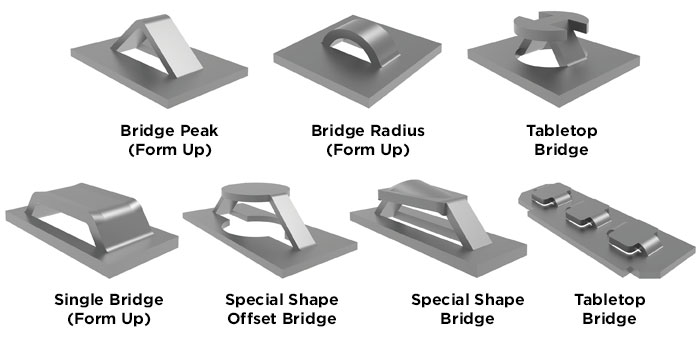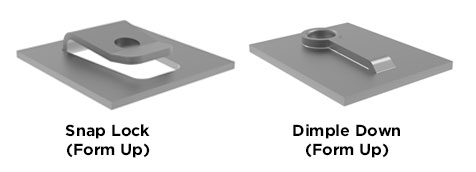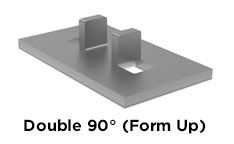There are many configurations for a lance and form tool. Knowing the ins and outs of these applications will help in ordering your tooling as well as in the manufacturing process.
To ensure your tool creates the quality form consistently and reliably, we need the following information:
- Machine Make and Model
- Material Type and Thickness
- Form Up or Form Down – Wilson Tool always recommends forming up when using a Lance & Form tool. Lance & Form Down tools are not self-stripping (i.e. the die does not have a die cap or springs). Because of this, the tab may bend when stripping and we are unable to guarantee the form if you opt to form down.
- Dimensioned Drawing (electronic file preferred)
- Spacing to Closest Adjacent Form
- Are you running the tool in an auto-index station?
Content Links
Bridge Lance & Form
Applications: Bridge type lance and forms can be used for shear stops, locators, card guides, ventilation and wire tie downs. They are cut on two sides and formed on two sides.
Features
- The Wilson Tool design gives a positive form, which ensures a high-quality part
- Small and large station holder provides both cost savings and flexibility; purchase only a punch tip, ejector and die assembly to change size; use the same upper holder for other applications
- Special lead-ins available
- Form-down bridges are made self-stripping
- Optima® coating available for extending tool life on widths greater than .098" (2.5mm)
- Large station holder is ABS/WLS ready, minimizing wear and maintenance
- All tools are tested and inspected before shipping
Considerations
- Material specific (if holding opening)
- Thinner material may be used, but the quality of the form and dimensions will change
- Never use on thicker material or damage will occur
- Width should be 1.5 times the material in mild steel and aluminum; 2 times the material in stainless
- Width less than .070” (1.78mm) will alter price and may tear
Design Variation Options

Lance & Form < 90°
Applications: Lance and Forms < 90° are used for a variety of applications including clip attachments, shelf hangers, air flow, decoration and wire harnesses.
Features
- High-quality lance and forms are assured with Wilson Tool’s positive form and self-stripping design
- Small and large station holders provide both cost savings and flexibility; purchase only a punch tip, ejector and die assembly to change size; use the same upper holder for other applications
- Optima® coating available for extending tool life
- Large station holder is ABS/WLS ready, minimizing wear and maintenance
- All tools are tested and inspected before shipping
Considerations
- Made for a specific material thickness; never run on thicker material or damage will occur
- A taper of 5° per side should be added to aid in stripping on large station tools
- Must specify if being run in an auto index station
- Width should be 1.5 times the material in mild steel and aluminum; 2 times the material in stainless
- Width less than .070” (1.78mm) will alter price and may tear
Design Variation Options

Lance & Forms of 90°
Applications: Lance and Forms of 90° are used for air flow, stops and wire feed openings.
Features
- High-quality lance and forms are assured with Wilson Tool’s positive form and self-stripping design
- Optima® coating available for extending tool life
- Large station tools are made Punch, Stripper and Die Assembly
- All tools are tested and inspected before shipping
Considerations
- Height (top to top) must be a minimum of 1-1/2 times the material thickness
- May need to be pre-punched around the tab, or in front of tab, depending on application and material
- Made for a specific material thickness; never run on thicker material or damage will occur
- Tolerance of angle needed; we can hold +0°/-3° for mild steel and aluminum, and +0°/-5° for stainless steel
- Must specify if being run in an auto index station
- Width should be 1.5 times the material in mild steel and aluminum; 2 times the material in stainless
Design Variation Options

Louvers
Applications: Louvers are used as stops and connectors. Louvers are used in a variety of industry applications that require airflow such as electrical enclosures, HVAC and food service equipment.
Features
- Single hit Louvers can be placed back to back (no web between Louvers)
- Keying on Thick Turret tools at 0°, 90°, 180° and 270° is standard.
- Sharpening instructions provided with the tools or factory sharpening is available
- The large station universal holders provide both cost savings and flexibility; purchase only pocket, cutting and forming inserts to change size; use the same upper holder for other applications such as lance and forms
- Large station thick turret holder is ABS/WLS ready, minimizing wear and maintenance
- A+ cartridge for louvers up to 3.500” long
- All tools are tested and inspected before shipping
Considerations
- The width should be 2 to 3 times the height or excessive drawback will occur
- Max. width of .750”
- Form angle of 40° – 85° from sheet works well; 45° is preferred
- 5° taper per side is recommended
Design Variation Options

Thread Loop
Applications: A Thread Loop from Wilson Tool is a great solution for eliminating secondary operations where a threaded hole is required: Thread Loops are always on the edge of the sheet; 3, 4 and 5 tabs are most common; Secures two perpendicular sheets together
Features
- The Thread Loop tool allows a significant reduction in manufacturing time, supplemental hardware and assembly time
- The Wilson Tool design gives a positive form, which ensures a high-quality part
- Reduces costly hardware and assembly time
- Optima® coating available for extending tool life
- All tools are tested and inspected before shipping
Considerations
- Made for a specific material thickness
- Must be sent back to Wilson Tool for sharpening
Zip-Tech
Applications: Eliminate expensive fastening methods in many applications.
Features
- Zip Tech lance and form tool fabricates snaps to join metal parts together without time consuming and labor-intensive welding and grinding operations, spot welding or other fastening methods.
- Available in any style NC tooling
- Able to join different types of material together as long as they are the same thickness
- All tools are tested and inspected before shipping
Considerations
- Three tools required: .080” diameter prepunch; “T” shape to punch around the tabs; Special lance and form up with a half shear down (Zip Tech tool)
- Zip Tech tool is material specific
- Proven in 22 – 14 gauge materials
November 05, 2020
